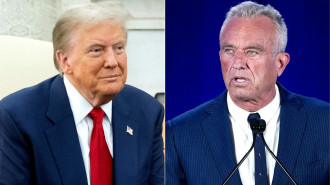Algeria orders independent news blackout as protests continue
Two independent news websites have been blocked in Algeria amid continuing anti-government protests, the Committee to Protect Journalists (CPJ) reported on Monday.
The two news sites, Tout Sur L’Algérie and Algérie Part have been inaccessible since 12 June. Several social media platforms were also blocked in the country as secondary school exams started on Sunday, the CPJ said.
Lounes Guemache, the director of Tout Sur L’Algérie said that the website had become inaccessible on internet services provided by the state-owned telecommunications provider Algérie Telecom, and that the site's IP address had been deliberately blocked.
Abderrahmane Drizi, who works for Algérie Part said that that website was blocked on the same day.
CPJ Middle East and North Africa Representative Ignacio Delgado said: "It is troubling that connections to Tout Sur l'Algérie and Algérie Part's websites remain disrupted at a time when online news outlets are most needed. Internet censorship is not acceptable at any time, and certainly not during civil unrest."
As secondary school exams started on Sunday, social media platforms such as Facebook, Twitter, WhatsApp and YouTube were blocked. This has happened before, but usually the disruption is announced before action is taken.
Tout Sur L’Algérie and Algérie Part were not given prior information that they would be blocked.
Tout Sur L’Algérie was previously blocked for a month in October 2017.
Protests in Algeria began in February 2019, when former President Abdelaziz Bouteflika announced that he would be running for a fifth term.
They continued after he resigned in April, as protesters demanded the removal of his inner circle.
Officials and businessmen close to Bouteflika, including his brother Said, have been arrested.
However, the new Algerian government - led by acting President Abdelkader Ben Salah - has engaged in several acts of censorship against the media, including sacking a state TV presenter who expressed support for protesters and preventing foreign journalists entering the country.







 Follow the Middle East's top stories in English at The New Arab on Google News
Follow the Middle East's top stories in English at The New Arab on Google News
![The new film casts Israeli actors to tell the story of Mary while leaving out Palestinians [Getty]](/sites/default/files/styles/image_330x185/public/2024-11/GettyImages-2172155541.jpg?h=199d8c1f&itok=wJWyXDEQ)
![Ben & Jerry's has taken Unilever to court for its alleged attempts to silence it [Getty]](/sites/default/files/styles/image_330x185/public/2024-11/GettyImages-2183900214.jpg?h=199d8c1f&itok=jEcYtQ64)
